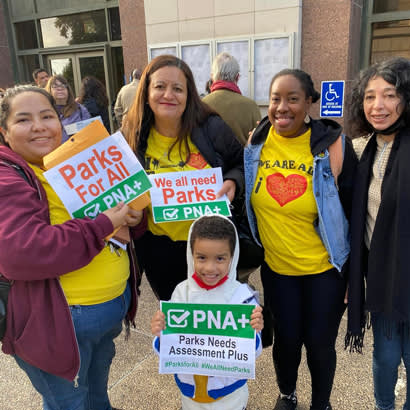
Since July is Park and Recreation Month and this year’s theme is “Where Community Grows,” I would like to recognize the importance of community-based organizations (CBOs) in parks and recreation. As a planner for over 17 years at the Los Angeles County Department of Parks and Recreation (DPR), I have had the honor and privilege of partnering and working closely with numerous CBOs in L.A. County on equity-driven, transformational plans and projects, including the Countywide Parks Needs Assessment, Community Parks and Recreation Plans for six park-poor unincorporated communities, the Earvin “Magic” Johnson Recreation Area Master Plan, and the Parks Needs Assessment Plus.
CBOs play a crucial role in enhancing parks and recreation facilities, engaging community members, and promoting social cohesion. Often led and driven by passionate community leaders and representatives, these organizations contribute significantly to the betterment of public spaces like parks, making them more vibrant, inclusive, and beneficial for the entire community. Highlighted below are some ways that CBOs positively benefit communities through their involvement in parks and recreation:
- CBOs bring a unique perspective and intimate knowledge of the community's needs and preferences. They are deeply rooted in the locality, understanding its history, challenges, and opportunities. By collaborating and communicating with local park agencies like DPR, CBOs work to ensure that park improvements and programming align with the community's needs and desires, creating the most appropriate, relevant, and accessible amenities and programs.
- CBOs empower community members by encouraging active participation and volunteerism. They offer a platform for residents to contribute their skills, time, and ideas towards activities such as park maintenance, event organization, and program implementation. This active involvement fosters a sense of ownership and pride in the community's public spaces, resulting in increased stewardship and a reduced likelihood of vandalism and neglect.
- CBOs contribute to social cohesion and community bonding. Parks and recreational facilities are hubs for interaction, recreation, and cultural exchange. By organizing events, festivals, and other activities with local park agencies, CBOs help to create opportunities for diverse groups to come together, fostering a sense of unity and understanding among community members. This social integration strengthens the fabric of the community and promotes a safer, more inclusive environment for everyone.
- Some CBOs focus on environmental justice, sustainability, and conservation. By organizing clean-up drives, tree planting initiatives, and educational programs, they raise awareness about environmental issues like shade equity and promote responsible use of natural resources. Through their efforts, these organizations ensure that parks and recreation spaces are planned, designed, improved, and maintained with sustainability in mind.
- In addition to their social and environmental contributions, CBOs also enhance public health and well-being. Parks and recreational facilities offer spaces for physical activity, relaxation, and stress relief or respite. Some CBOs organize fitness classes, walking clubs/groups, and wellness programs that encourage residents to lead healthier lifestyles, thereby reducing the burden of lifestyle-related diseases and improving overall community well-being.
- CBOs help to shape policy on parks and recreation, acting as advocates, stakeholders, and facilitators of community outreach and engagement. These organizations individually and often collectively (by forming an alliance or coalition) provide valuable input, mobilize resources, and amplify the voices of the people and places they represent. CBOs often also serve as intermediaries and bridge the gap between government officials and community members, facilitating a more inclusive and collaborative process for policy development.
- While parks should be considered essential infrastructure, they are rarely adequately funded. CBOs play an important role in securing and mobilizing funding and other resources for parks and recreation projects and programs. They actively seek grants, donations, and corporate sponsorships to support park improvements and programming. Their ability to engage with private and philanthropic sectors extends the financial reach of projects, making them more feasible and sustainable in the long run.
Final Thoughts
CBOs are vital stakeholders in developing and enhancing parks and recreation programs. Their deep connection with the local community, emphasis on equity, volunteerism, promotion of social cohesion, commitment to sustainability, and contributions to public health make them indispensable in creating vibrant, inclusive, and resilient public spaces and communities. Park agencies should recognize and support the invaluable role these organizations play in shaping the well-being and character of communities. Only through such collaborative efforts can we ensure that parks and programming continue to meet the needs of present and future generations. Here in Los Angeles County, we are fortunate to have many CBO partners and will continue to collaborate with them to advance park equity and improve the quality of life for our residents, especially the most vulnerable.
Clement Lau, DPPD, FAICP, is a Departmental Facilities Planner with the Los Angeles County Department of Parks and Recreation.


